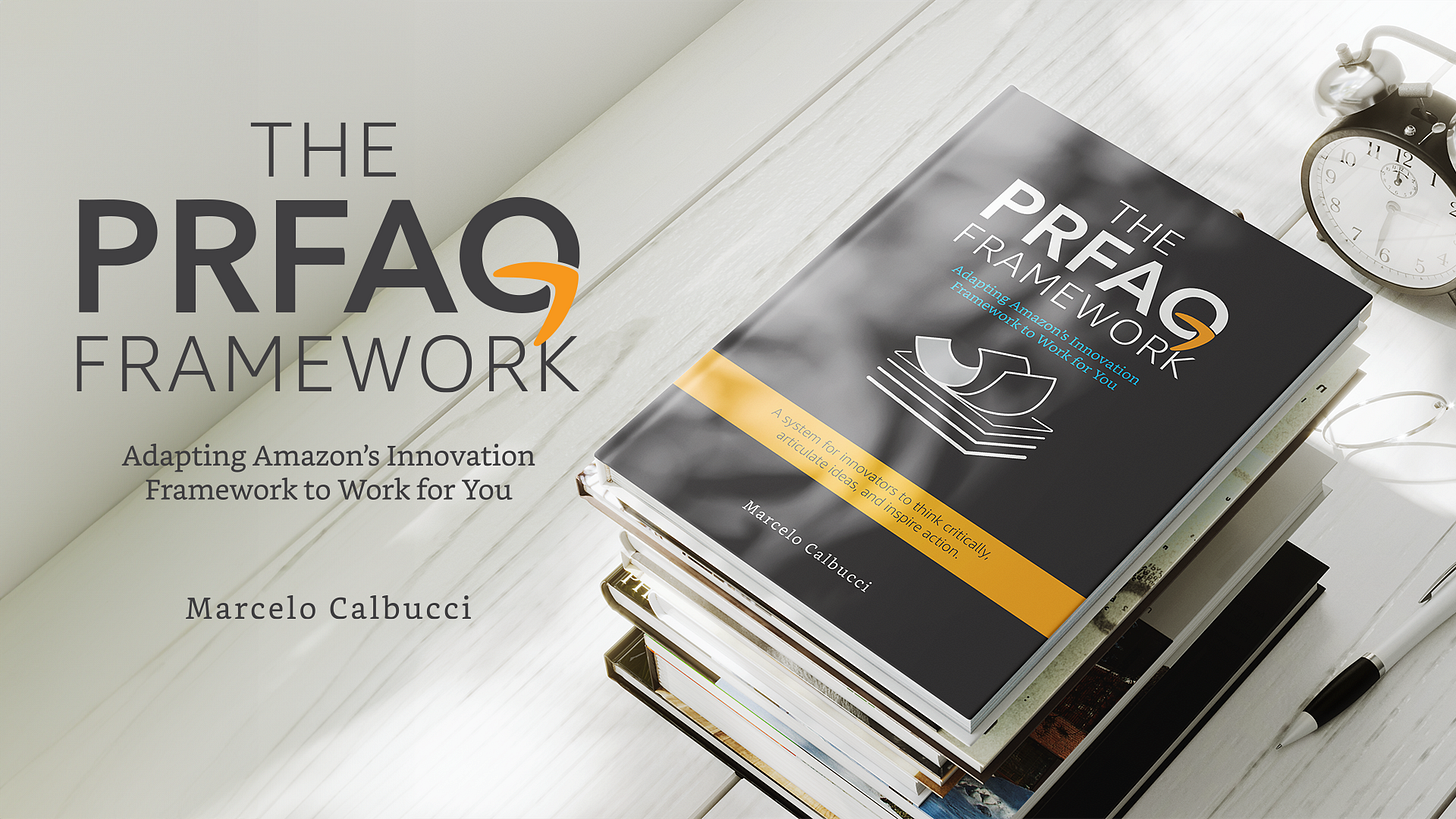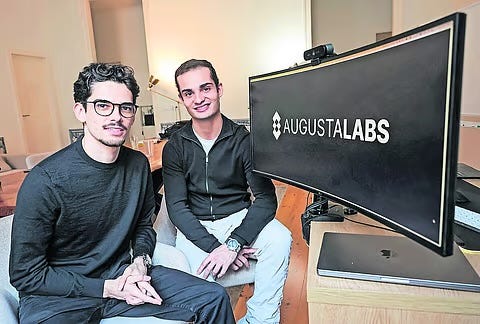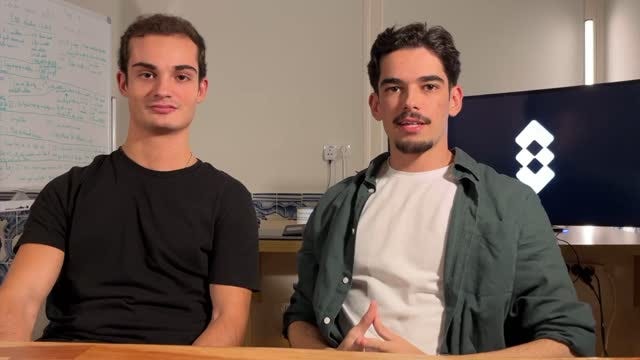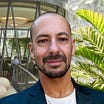How to build conviction for an idea, and discover the AI of Augusta.
In this newsletter, we'll talk about our first workshop, Marcelo Calbucci new book, and the latest AI Portuguese startup – Augusta Labs.
Hey community.
First up, we’re organizing our first workshop!
Yep, matosinhos.tech is bringing together our community to explore how to design better services and experiences in our Service Design Workshop.
Whether you’re into product, design, or want to understand how to use service design tools, like service blueprint, this is for you. Plus, it's happening in the amazing DeHouse península – check it out here and join us!
We’re also thrilled to have Marcelo Calbucci as our guest writer in this edition, and if anyone knows what it takes to build and grow a company, it’s him!
Marcelo is a tech entrepreneur, product & engineering leader, and an all-around startup trailblazer. He’s built and scaled products across industries, founded Seattle 2.0 (which later became part of GeekWire), mentors startups at TechStars, Seedcamp, and SXSW, and has a new book. So, don’t miss his insights and the opportunity to have a free copy of The PRFAQ.
Last but not least, sat down with the founder of Augusta Labs for an exclusive interview. If you’re into AI, innovation, and what’s happening next in Portuguese tech, you’re going to love this interview. Augusta Labs is doing some seriously cool things, and we’re excited to share their story with you.
Let's go!
How to build conviction for an idea!
Have you ever had to put a plan in place and felt uneasy about its direction? Or, the flip-side of that, have you ever proposed something you thought was brilliant only to become obviously wrong after the first person provides feedback? You are not alone.
While working at Amazon, we used the Press Release and Frequently Asked Questions (PRFAQ) framework to debate, discover, and decide about initiatives at the company—from replacing a vendor to launching a new product, to starting a new business to changing a company policy. The theory behind this framework is that creating a coherent narrative and using that as the artifact for conversation among team members leads to ideas developing closer to their best version.
You can imagine the PRFAQ was the inverse of “the blind men and the elephant” parable. In that story, each blind man touches a different part of an elephant and comes away with a different description of an elephant. In a PRFAQ, each person brings their expertise to provide a perspective to an idea that no single person can elaborate by themselves. Thus, looking at an idea from the point-of-view of a software engineer, UX designer, product manager, lawyer, marketer, or a finance manager and making it into a better idea.
The PRFAQ framework provides a unique vision and strategy discovery mechanism for initiatives. Regardless if you are founding a startup, adding features to a product, or modernizing a backend service at your organization, PRFAQs provide a learn-write-listen feedback to evolve ideas into a viable, feasible, and valuable version.
This framework captures the vision desired by the team, working backwards from the customer, and provides the structure for a strategy to be defined and decided. It’s collaborative, which avoids problems such as stakeholder buy-ins, team alignment, and coordination.
A benefit of PRFAQs is that the written narrative format encourages the team to think critically about their idea. Writing is a well-known and effective form of thinking. Many times, when you write something, it takes a different direction than what you started with. That’s your brain elaborating and evolving your original thinking. The writing also helps with the articulation of ideas. When you clearly communicate ideas to others, you’ll get relevant and valuable feedback. Finally, when you collaborate with team members to write a PRFAQ, you are not getting the best of each person; you are also building conviction and getting them owning the solution, which will inspire people to act!
I wrote the book The PRFAQ Framework to adapt Amazon Working Backwards’ innovation framework to work for everyone. The book goes into the details of the framework, the method, and explains how to write great business narratives, for PRFAQ or any other topic.
I’m partnering with matosinhos.tech to offer five free copies of The PRFAQ Framework. The first three people to enter giveaway will get a copy, and we’ll be drawing two more copies on February 15. Visit The PRFAQ to learn more.
Inside Rodrigo Fernandes’ Vision for Augusta Labs
by
On January 29, I sat down for a video call with Rodrigo Fernandes, the 24-year-old co-founder of one of Portugal’s most ambitious AI ventures.
Seriously, if you haven’t heard of Augusta Labs yet, you probably will soon.
Founded in late 2023 by Rodrigo and João Cerejeira, Augusta Labs specializes in custom AI solutions that help businesses automate processes, optimize decision-making, and gain a competitive edge.
With major clients like Solverde, Radio Popular, and Sporting de Braga, the company surpassed €450,000 in revenue last year and is positioning itself at the forefront of Portugal’s AI-driven market. But what truly sets them apart isn’t just their technical expertise – it’s their relentless, almost obsessive mindset.
From Sprint to Marathon (But Still Sprinting)
From the moment our conversation started, Rodrigo’s energy was unmistakable. He spoke fast, thought faster, and had a clear sense of direction.
I had read up on his past work – his Ponto de Inflexão podcast, where he explored entrepreneurship, and his outspoken takes on X – and I was curious to see how his “always be sprinting” motto translated into real life.
He did not disappoint.
"Frankly, this is by far the most important thing in my life," Rodrigo said when I asked how the past few months had been. "It’s the project I’m building to ensure that everyone around me is extremely well-off."
For him, Augusta Labs has evolved from a sprint into what he calls a “marathon of sprints.”
"If I’m serious about this – and if everyone in the company believes in it so much – not sprinting would be disrespecting ourselves," he explained.
Rodrigo is my age, but his vision is bigger, more personal. "Running with others makes it easier," he added. "And running really fast with others? Even easier."
I decided to bring up one of his old tweets: "I just want to create an empire."He laughed but didn’t back down. For him, this isn’t just a job – it’s a mission.
The Next Big AI Bet
Unlike most AI startups, Augusta Labs doesn’t limit itself to a single industry. Their approach is highly experimental, always probing multiple sectors for AI applications.
So when I asked Rodrigo what he believed was the most promising AI-driven product, I expected the usual suspects – automation, predictive analytics, chatbots.
Instead, he pointed to something unexpected.
"If I had to pick one area, I’d say it’s public procurement. It’s something we’re exploring deeply with some of our clients."
His excitement was evident.
"Every city hall, public hospital, and school needs to buy goods and services, and they publicly announce what they need (…). We can help companies use artificial intelligence to identify these opportunities, analyze the text, determine whether they are relevant or not, and provide a more precise response."
It made sense. AI could cut through bureaucratic red tape, helping businesses tap into government contracts they might otherwise miss.
Rodrigo sees even bigger potential.
"I think this is an area where we’ll be able to create one of the first truly autonomous sales agents," he explained. "Selling to the public sector is so clear and transparent – well, not always, but that’s the goal – that, if we succeed, we’ll be achieving something very important for the companies."
I found myself wondering if this model could scale beyond Portugal. Rodrigo believes it absolutely can.
"Sales, in general, is one of the most interesting areas (…) we’ll be able to have assistants going out there, reaching out to people, responding to emails, eventually making calls, writing documents—in short, handling a big part of the sales process."
Finally, I asked if this was Augusta Labs’ first major step toward creating its own AI products.
"We’re running early experiments, working with some companies to really understand the potential. It’s not public yet, but yeah, it’s something we’re seriously exploring."
The AI Revolution: Is Portugal Ready?
As our conversation shifted to the broader impact of AI, I brought up something Rodrigo and João had publicly discussed before: AI won’t just replace factory jobs or manual labor – it’s coming for white-collar professions too.
Rodrigo greeted the topic with enthusiasm. To him, this isn’t a distant future – it’s already happening.
"Every single day, we see new updates, new announcements, and product launches that only deepen the pace of progress we’ve been witnessing. For example, recently, China’s DeepSeek, which is yet another validation that artificial intelligence is coming – and it’s coming everywhere, in a fairly democratic way."
But while AI continues its relentless expansion, Rodrigo believes Portugal isn’t keeping up – and that’s a problem.
"In Portugal, for example, political candidates or parties don’t talk much about artificial intelligence, even though I believe it could be the defining issue – on a more macro scale – of this and the coming legislatures."
His frustration was obvious. To him, the country is reactive rather than proactive. And it’s not just politics.
Rodrigo believes companies, universities, and institutions are also failing to take action.
"People are way too asleep at the wheel (…) I even try to guide my sister, who just started college, on how she can start adapting to these upcoming changes (…) It’s kind of insane that there haven’t been any changes in college admission patterns as a result of what’s happening with artificial intelligence."
Winners and Losers in the AI Age
At this point, Rodrigo wasn’t just talking about disruption – he was making bold predictions about which careers would rise and which would fade.
"For example, I’d say that computer engineering as a profession might lose some appeal, as well as more conventional jobs in business, like economics or management degrees that typically lead to consulting."
The real winners?
"Meanwhile, trades like plumbing or electrical work are likely to gain more importance, and I think the world hasn’t fully realized that yet."
To him, the passivity of institutions and individuals alike is the biggest risk.
"Those who prepare the earliest will be the ones who gain the most from this. There needs to be a real sense of urgency in implementing these solutions – like, ‘Man, I need to implement this now, I’ll do whatever it takes to make it happen.’"
Portugal’s Ambition Problem
Rodrigo is outspoken about Portugal’s lack of ambition, so I had to ask: Does he see a change in our generation? Are young people becoming more driven?
His response was characteristically blunt.
"Well, maybe I have a slightly pessimistic view, but I feel like this applies just as much to our generation. When I look around at what young people are trying to do, it always feels like more of the same – there’s a lot of analog and mimetic thinking."
To Rodrigo, the formula for success is simple: authenticity eliminates competition.
"If you’re truly authentic, you’re shaping things in the world in a way that aligns with you – and there’s only one of you, with your unique genetic makeup. So, naturally, you won’t have competition."
But most people don’t get it. His frustration was almost visceral.
"I think people need a wake-up call, and sometimes I just feel like grabbing someone and literally shaking them – ‘Come on, man, wake up! Wake up!’"
This isn’t just something he preaches – it’s something he lives by.
"The moment I’m not trying to level up, I’m failing."
Youth and AI: An Advantage or a Barrier?
Given that AI is still a relatively young industry, I asked Rodrigo whether his and João’s age had ever made it harder for Augusta Labs to land clients – or if, in this field, youth was actually an advantage.
He didn’t hesitate.
"We’re lucky because we’re a bit of an exception. We’re unique, in a good way. And whenever something is unique in a good way, the world tends to appreciate it."
Still, not everyone embraces their unapologetically ambitious approach.
" If these were traits the world didn’t respect (…) like ‘these guys are too aggressive’ (…) or ‘they think too highly of themselves.’ (…) Well, honestly, I think what we really are is just deeply convicted in what we’re doing. And whether the world likes it or not, it’s just going to have to deal with us."
This attitude – uncompromising, relentless, and high-energy – is what sets Augusta Labs apart. While others are still analyzing the AI wave, they’re already riding it.
Building a Powerhouse Team: The Obsession with Talent
For all of Augusta Labs’ ambition, Rodrigo is clear on one thing: Nothing happens without the right people.
When I brought up the stereotypes surrounding this new wave of ambitious entrepreneurs, I asked him how they select their team members. Given how fast they’re growing, is it easy – or is it a challenge?
His response was immediate.
“That is by far the most important topic in the entire company. At the end of the day, a company is just a group of humans working on specific tasks, so those people are the most important asset any company has, honestly."
Hiring at Augusta Labs: It’s Not Just Talent, It’s Mentality
At Augusta Labs, skills alone aren’t enough. Rodrigo and João are obsessive about making sure every new addition aligns with their high-energy, high-output culture.
But as their standards rise, the pool of potential hires shrinks.
"We have young, ambitious people who really want to take over everything and do it at high speed, building something massive. And it’s tough to always maintain that standard, but I think there’s no other option."
At this point, I interrupted. That’s why stereotypes are the issue, isn’t it?
There are ambitious, talented people in Portugal, but many don’t put themselves out there. They’re not visible. They’re not easy to find.
Rodrigo agrees completely. That’s why Augusta Labs isn’t passively waiting for people to apply. Instead, they’re aggressively hunting for talent in unconventional ways.
"Exactly. I think people aren’t out there as much as they probably should be, so it’s on us to be relentless in that search (…). First of all, we go out there with a megaphone – we’re even making a post tomorrow saying, ‘Hey, we’re hiring these kinds of people, and this is what you need to be like.’"
They don’t rely on traditional recruitment. Instead, they go where their kind of people are.
"We’re on X, we’re in online circles where these kinds of people usually hang out, and we’re persistent in reaching out."
Finding the Right People: A Culture of Extreme Ownership
And when they do find the right people?
"Almost no one comes out and says, ‘I want young, insanely ambitious, slightly crazy people working here. This is your home. This is where you can grow and build something of real value.’ So, when someone sees this kind of culture, when they recognize it, they get really excited. And that makes hiring them incredibly easy – it happens fast."
But that doesn’t mean lowering their standards.
"I like the phrase ‘A players hire A players, B players hire C players.’ So, we can’t let our culture and our team be contaminated by someone who doesn’t belong here."
For Rodrigo, great companies aren’t built by accident. They’re architected, piece by piece. And at Augusta Labs, that architecture starts with finding the right people – the ones who aren’t just smart, but hungry.
From a Startup to an AI Empire
I had seen one of Rodrigo’s LinkedIn videos where he talked about his goals for the past year. One stood out: turning Augusta Labs into Portugal’s top hub for young talent. I congratulated him on the ambition – but then pushed further. What’s next? Where does he see Augusta Labs a year from now?
Rodrigo leaned in, clearly eager to map out the company’s future.
"That’s a loaded question (…) I’d say that a year from now, Augusta Labs will have more people and will essentially be a collection of initiatives – all connected by AI and all driven by young people with the characteristics we talked about."
But what does that mean, exactly?
"So, I think Augusta Labs will evolve into a constellation of small initiatives or companies – some focused on products, some on services, and even some transforming boring real-world businesses in our own way. Augusta Labs will become (…) the best vehicle in Portugal, by far, the best in Europe, and eventually one of the best in the world for enabling young, highly ambitious people to work in the best industry out there, make a huge impact, and grow massively while doing it."
Scaling Augusta Labs: The Roadmap to an AI Powerhouse
Of course, scale and ambition come with financial goals. Rodrigo has no doubts about Augusta Labs’ trajectory.
"We will be generating several million in revenue a year from now – that’s our clear goal. And honestly, I think it’s very achievable."
When asked how they plan to get there, he outlined three key pillars shaping Augusta Labs’ strategy.
1. Small, Fast, and Powerful Teams
"We want to keep our teams small because we believe they work wonders – they move fast, can change direction quickly, and maintain great dynamism. At the same time, they achieve high levels of productivity, especially with artificial intelligence."
To emphasize his point, he drew a military analogy.
"A bit like SEAL Team Six in the U.S. – a small, highly focused group with a clear objective and all the tools needed to get things done."
2. The Evolution of Leadership
For Augusta Labs to scale, Rodrigo and João’s roles must evolve.
"What we also need to do to get there is, interestingly, a shift and an evolution in my role and João’s. It’s about starting to build out these different initiatives and ensuring that each one operates independently. It’s an interesting evolution – one that, honestly, I didn’t expect to happen this early in the company. But I really think it’s our path, our destiny."
3. A Relentless Focus on Talent
At the heart of Augusta Labs' vision is its people.
"We also need people to make this happen. So, going back to the idea of top talent – it’s about having the best people, bringing in all the best young talent in Portugal to work with us. Because, man, if they’re here, crazy things are going to happen. We’re going to build a highly respectable mafia."
The Billion-Dollar Question
Rodrigo’s goals aren’t just ambitious – they’re game-changing. So I had to ask: Does Augusta Labs still want to become Portugal’s youngest-founded unicorn?
His answer was immediate.
"Yeah, of course. We have huge ambitions – we want our company to be worth at least a billion euros, no question. And beyond that, we want it to generate over a billion in revenue, which is even more ambitious and, honestly, even more exciting."
But Augusta Labs won’t take the conventional path.
"We’re not going to do it the conventional way – it won’t be the classic story of ‘software company, raise a VC round, then raise another, and so on.’ We believe the future will reward different models, and I’d say we’re possibly leading one of those."
If they weren’t convinced?
"The people in the company wouldn’t be here if we didn’t believe this was our destiny – and, frankly, neither would I."
Final Thoughts: The Message Rodrigo Wants to Send
As our conversation came to an end, I asked Rodrigo a classic closing question: What message would he like to leave with our readers?
His response was, unsurprisingly, bold and direct.
"Man, follow us – we’re everywhere. Augusta Labs is on LinkedIn, on X, we have our websites, we’re out there. Stay tuned."
But his real message was about something bigger.
"Maybe this is a completely unwarranted call to action, but I really think people should – super cliché, I know – do things they actually enjoy and do them in an authentic, real way. Do them because you like them, not because the people around you do."
His best advice?
"It’s absolutely crucial to have clarity on ‘Who am I? What do I want to do?’ and invest in that (…) if you just follow what the world tells you, you’ll end up completely lost and desperate (…). So, yeah, it comes back to being authentic, chasing something that truly fulfills you, because that is what will actually lead to a meaningful life."
He paused for a moment before adding:
"That’s what I’d tell my younger sister – so why not say it to the world?"
Rodrigo and Augusta Labs: More Than Just Ambition
As I reflected on our conversation, one thing became clear: Rodrigo isn’t just building a company – he’s shaping a new kind of entrepreneurial culture.
He’s my age, yet he belongs to a generation of founders who aren’t just playing the game – they’re changing it entirely.
Augusta Labs refuses to follow the traditional venture capital model. They prioritize control, speed, and execution over external funding. Instead of chasing investment rounds, they’re chasing results.
Over the course of our conversation, I saw firsthand how intensely focused Rodrigo is on winning. He’s sharp, direct, and unapologetically confident. At the same time, he’s refreshingly honest, making him someone impossible to ignore.
But what struck me most wasn’t just Rodrigo himself – it was the company he and João are building. A company where speed matters more than structure, where talent beats experience, and where winning isn’t just the goal – it’s the expectation.
Right now, Augusta Labs is sprinting forward. And if they keep this pace, they just might outrun everyone else.

















